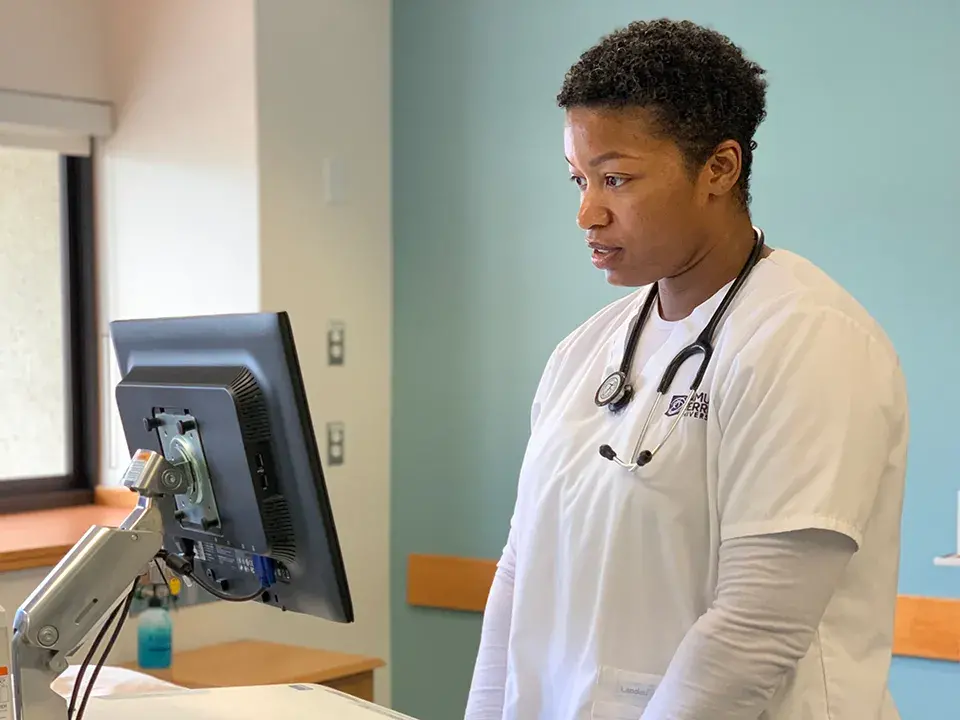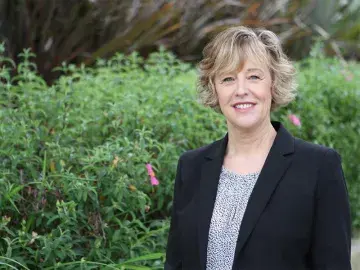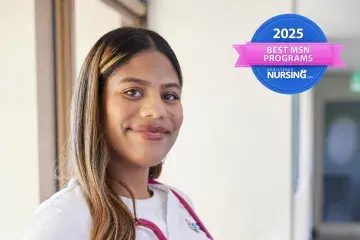Air Force Vet Lands Exclusive VA Internship

Megan FitzGerald BSN ’19 was nervous during her interview for an internship at the Palo Alto Veterans Affairs (VA) Medical Center. As a Samuel Merritt University nursing student who had just completed the first year of her prelicensure program, FitzGerald knew that she didn’t have many clinical experiences to draw on so she used what she had learned in class and from her military training.
Turns out she aced the interview and became one of a select few nursing students across the Bay Area to be accepted into the VA Learning Opportunity Residency (VALOR) program, a paid internship that teaches valuable clinical skills. The VA, as the nation’s largest employer of nurses, also offers VALOR students a leg up for a job after graduation.
“I feel like everything prepares you for what is next,” says FitzGerald of her successful admission to the program. “I have been able to use grit, realizing that what I don’t know I’ll find out.”
Families cope with dying
At the Palo Alto VA, FitzGerald spent more than 500 hours caring for critically ill patients in the medical-surgical intensive care unit from summer 2018 until she graduated in May from SMU’s Bachelor of Science in Nursing program. She says that with the guidance of her assigned nurse preceptor and working closely with an interdisciplinary health care team, she built her skill set and gained confidence.
“As a teaching hospital, they had me in there doing everything, from recovery procedures to preparing for codes to doing compressions,” she says. “They wanted me to be completely exposed to what was happening.”
FitzGerald also learned about the emotional turmoil that families cope with when dealing with life-and-death medical problems because she says nearly half of the patients on the unit don’t survive. Her first patient was a man in his 80s on a ventilator and other means of life support, a high level of care she had never before been exposed to as a nursing student. Later, she helped to treat for a veteran who survived active duty only to be shot in the head during a domestic violence conflict.
“There are different patient and family needs that we as nurses have to address,” she says. “We have to broach subjects like ‘dying’ that may be uncomfortable for patients and their families, but a very necessary discussion especially in the ICU.”
Another lesson that FitzGerald learned through the VALOR program was that despite the rivalry among branches of the military, there is also a common bond.
“VA patients are more at ease when they know a vet is taking care of them who knows the hardships they’ve been through and gets where they’re coming from,” she says.
Discovered nursing through loss
FitzGerald’s road to joining the military and becoming a nurse began when her father was hospitalized for two years. She witnessed the impact nurses had on patients and their families. She says her father bonded with one particular nurse, who listened carefully to the family’s concerns.
“Her approach was so warm,” recalls FitzGerald, who had previously planned to become a high school English teacher. “I realized that I could do that and saw in myself that compassion. On the hospital floor, you become an advocate for your patients and you get very invested in their outcomes.”
In 2011, a few years after her father passed away, Fitzgerald joined the U.S. Air Force with the goals of serving the country and becoming a nurse. She says four years of military service changed her.
“I was surrounded by a bunch of strong women who poured a lot into me and groomed me for leadership. It allowed me to do the unexpected, to push myself beyond my limits,” says FitzGerald. “Now I don’t run away from challenges; I embrace them.”
When the time came to apply to nursing schools, the Oakland native says she chose SMU’s Bachelor of Science in Nursing program because of its academic reputation and the high passing rates of its graduates on the nursing license exam. But while FitzGerald was still completing her prerequisite courses, her mother’s health began to decline and she died after suffering a massive stroke.
“It was the hardest moment of my life,” she says. “Months later, when I got my acceptance letter, the first person I wanted to tell the good news to was my mother because she was my biggest cheerleader. It's in these moments where I find that I miss her most. She's no longer here to share in my victories.”
One of those victories was joining the VALOR program, an opportunity she says was recommended to her by SMU Veterans Resource Center Director Dennis McReynolds.
McReynolds says he admires FitzGerald for her positive attitude and her drive. “She’s really smart, she’s well-spoken, and she’s able to carry it through,” he says.
Carry her mother’s memory
Now, as she studies for her licensing exam, FitzGerald is looking to the future. She is torn between her desire to work with veterans and her love for newborns that began with a clinical rotation last fall in the neonatal intensive care unit at the Alta Bates Summit Medical Center. Wherever her path leads, she is hoping to remain in critical care nursing.
Meanwhile, the deaths of her parents are never far from her mind. That’s why she plans to get more involved in volunteering in the community to provide education about proper nutrition and prevention of diabetes and high blood pressure.
“It’s my passion project because my parents died so young,” says FitzGerald.
During her graduation, she says she carried her mother’s spirit with her as she received her diploma and is grateful for her SMU education.
“It has given me a strong academic foundation that allows me to both think critically and empathetically for my patients,” FitzGerald says. “I have been surrounded by professors who have fostered a great learning environment for the students. I am graduating feeling prepared and excited for my future as a nurse.”


